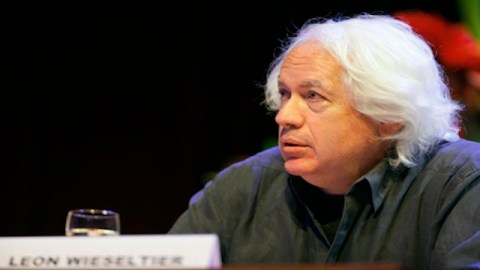“Celebrity Is Not A Literary Value.”

One cannot put it much better than this: Literature is a felicity, but it is not a festival. It is a proposal, or an infinity of proposals, for an emendation, or a transformation, of consciousness. It commends ideals of seeing and ideals of feeling and ideals of thinking, and even ideals of living; and no such instructions should be exempt from strenuous and unsentimental judgment, from the foul tempers of thoughtful people, or else nothing will weigh anything and we will be only compilations of the trends of our time.
This is an excerpt from Leon Wieseltier’s Washington Diarist column in The New Republic. He is writing apropos of having been criticized for being critical. Or, of having elected to publish a review critical of Jonathan Franzen’s novel, Freedom. The merits of Wieseltier’s argument have little—nothing—to do with what one feels about Franzen, or about any novel. This is a philosophical cri de coeur, written with equal parts wit, passion, and certainty.
He writes:
I was not aware that it is a heresy to hold that Freedom is not a masterpiece. There is something churlish about my friend’s insistence upon critical unanimity. Franzen’s book, after all, is fantastically popular. It is commercially immune from literary criticism. I am pleased that Franzen’s profits will accrue to a company that may be counted upon to apply them to the production of serious books by serious writers that will not attain similarly to the proportions of a pandemic. But if it is indeed a heresy to differ about Freedom, then I confess to being inclined against it. In his slyly invigorating essay on “the pleasure of hating,” Hazlitt complained that “the reputation of some books is raw and unaired,” and noted that “the popularity of the most successful writers operates to wean us from them, by the cant and fuss that is made about them, by hearing their names everlastingly repeated, and by the number of ignorant and indiscriminate admirers they draw after them.” Celebrity is not a literary value, and I do not believe in the wisdom of crowds. I think that crowds—well-read ones, too—are foolish and fickle. They are especially foolish when they regard themselves as a coterie. Their tastes need to be scrutinized with a hermeneutical hostility, because they are so easily invented and so easily manipulated. This is especially the case in a society consecrated supremely to promotion—that swoons over the pseudo-sagacity of Malcolm Gladwell, and regards people and the expressions of their souls as brands, and confuses techniques for marketing with techniques for living. The sales of Freedom say nothing about the qualities of Freedom. Has the book struck a chord? Of course. But that is anthropology, not literature; and nothing is more forgiving than anthropology.
Game, set, match.
This is only one small part of the pleasure of loving literature, and of caring about its place in the world: observing its internecine battles, large and small. The tennis match of how or if a certain work is reviewed will never subvert Rahm Emanuel’s absence in the White House as news. Yet: what was once called “letters” can also be called the literature of fighting. This is criticism. It is necessary. And Wieseltier is the Federer of this game.
There will always be myriad meaningless bloggers; there will only ever be one Literary Editor of The New Republic. This piece should be read by every English major, every young editor, everyone kid who cares about what George Plimpton once called The Quality Lit Game. Because Wieseltier is right: literature is not anthropological. Critical vogue may succeed in instructing some of us how to think, but it will always fail in forcing any of us how to feel.




